C语言常见头文件计算机二级必备
C语言头文件大全

标准C语言头文件ISO C标准定义的头文件(24项)<assert。
h> 验证程序断言〈complex。
h〉支持复数算术运算〈ctype。
h〉字符类型<errno。
h〉出错码<fenv。
h> 浮点环境〈float。
h> 浮点常量<inttypes。
h> 整型格式转换〈iso646.h〉替代关系操作符宏〈limits。
h> 实现常量<locale.h〉局部类别<math。
h〉数学常量〈setjmp.h> 非局部goto〈signal。
h> 信号〈stdarg。
h〉可变参数表〈stdbool.h> 布尔类型和值〈stddef。
h> 标准定义〈stdint.h〉整型<stdio。
h〉标准I/O库〈stdlib.h〉实用程序库函数〈string。
h〉字符串操作<tgmath.h〉通用类型数学宏<time.h> 时间和日期〈wchar。
h〉宽字符支持〈wctype.h〉宽字符分类和映射支持POSIX标准定义的必须的头文件(26项)〈dirent.h〉目录项<fcntl.h> 文件控制〈fnmatch。
h> 文件名匹配类型〈glob。
h> 路径名模式匹配类型〈grp。
h> 组文件〈netdb.h> 网络数据库操作〈pwd.h〉口令文件<regex。
h> 正则表达式〈tar。
h> tar归档值<termios。
h> 终端I/O <unistd.h> 符号常量<utime.h〉文件时间<wordexp。
h〉字扩展类型<arpa/inet.h> Internet定义<net/if.h> 套接字本地接口〈netinet/in.h> Internet地址族 <netinet/tcp.h〉传输控制协议〈sys/mman。
C语言常见头文件 计算机二级必备
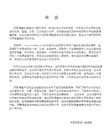
#include <list> //STL 线性列表容器
#include <map> //STL 映射容器
#include <iomanip>
#include <ios> //基本输入/输出支持
#include <iosfwd> //输入/输出系统使用的前置声明
#include <vector> //STL 动态数组容器
#include <cwchar>
#include <cwctype>
using namespace std;
//////////////////////////////////////////////////////////////////////////
你就可以自定义一个头文件,然后把这些头文件放到自定义的头文件中,然后在那个类开头包含自定义的头文件就行了,不需要再写以上头文件,这样就使代码显得简练易懂.
c++里面的类,函数,变量都有声明和定义的区别
在用到一个类或函数或变量之前,必须进行声明,但可以在之后定义。
比如
#include <cstdlib>
#include <cstring>
#include <ctime>
#include <deque> //STL 双端队列容器
#include <exception> //异常处理类
#include <fstream>
#include <functional> //STL 定义运算函数(代替运算符)
c语言开头格式

C语言的开头格式通常包括头文件和main函数,具体如下:
1. 头文件:#include <stdio.h>
这是一个预处理指令,它指示编译器在编译过程中引入标准输入输出库(stdio.h),以便后续的程序可以使用标准输入输出函数,例如printf()和scanf()等。
2. main函数:int main()
这是C语言程序的入口函数,程序将从这里开始执行。
main函数必须返回一个整数值,通常情况下,返回值为0表示程序正常结束,非0值则表示程序异常结束。
在main函数中可以编写程序代码,完成特定的任务。
例如,可以编写代码来计算两个数的和、输出一段文本、读取用户输入等等。
计算机二级考试C语言知识点总结
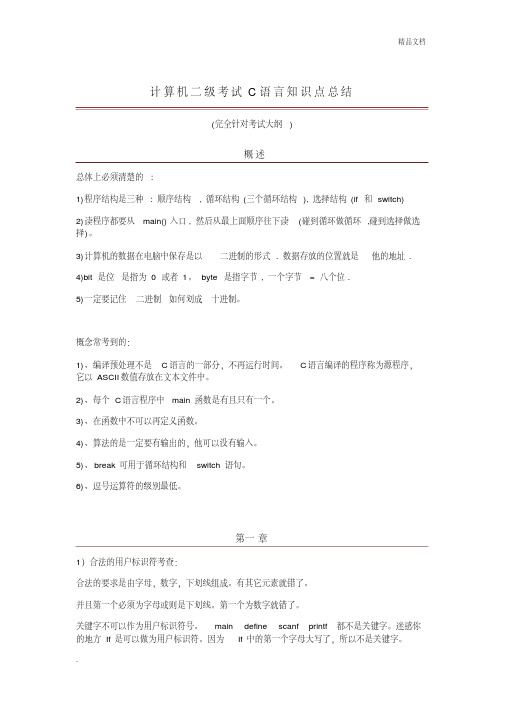
精品文档
. 计算机二级考试C语言知识点总结
(完全针对考试大纲)
概述
总体上必须清楚的:
1)程序结构是三种: 顺序结构, 循环结构(三个循环结构), 选择结构(if 和switch)
2)读程序都要从main()入口, 然后从最上面顺序往下读(碰到循环做循环,碰到选择做选择)。
3)计算机的数据在电脑中保存是以二进制的形式. 数据存放的位置就是他的地址.
4)bit是位是指为0 或者1。
byte 是指字节, 一个字节= 八个位.
5)一定要记住二进制如何划成十进制。
概念常考到的:
1)、编译预处理不是C语言的一部分,不再运行时间。
C语言编译的程序称为源程序,它以ASCII数值存放在文本文件中。
2)、每个C语言程序中main函数是有且只有一个。
3)、在函数中不可以再定义函数。
4)、算法的是一定要有输出的,他可以没有输入。
5)、break可用于循环结构和switch语句。
6)、逗号运算符的级别最低。
第一章
1)合法的用户标识符考查:
合法的要求是由字母,数字,下划线组成。
有其它元素就错了。
并且第一个必须为字母或则是下划线。
第一个为数字就错了。
关键字不可以作为用户标识符号。
main define scanf printf 都不是关键字。
迷惑你的地方If是可以做为用户标识符。
因为If中的第一个字母大写了,所以不是关键字。
CPP常用头文件及函数汇总
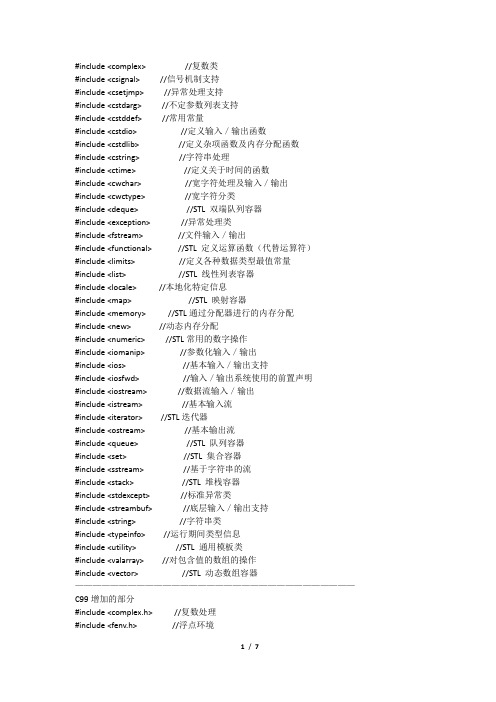
#include <complex>//复数类#include <csignal> //信号机制支持#include <csetjmp> //异常处理支持#include <cstdarg> //不定参数列表支持#include <cstddef> //常用常量#include <cstdio> //定义输入/输出函数#include <cstdlib> //定义杂项函数及内存分配函数#include <cstring> //字符串处理#include <ctime> //定义关于时间的函数#include <cwchar> //宽字符处理及输入/输出#include <cwctype> //宽字符分类#include <deque>//STL 双端队列容器#include <exception>//异常处理类#include <fstream> //文件输入/输出#include <functional>//STL 定义运算函数(代替运算符)#include <limits> //定义各种数据类型最值常量#include <list>//STL 线性列表容器#include <locale> //本地化特定信息#include <map>//STL 映射容器#include <memory> //STL通过分配器进行的内存分配#include <new> //动态内存分配#include <numeric> //STL常用的数字操作#include <iomanip> //参数化输入/输出#include <ios>//基本输入/输出支持#include <iosfwd>//输入/输出系统使用的前置声明#include <iostream> //数据流输入/输出#include <istream>//基本输入流#include <iterator> //STL迭代器#include <ostream>//基本输出流#include <queue>//STL 队列容器#include <set>//STL 集合容器#include <sstream>//基于字符串的流#include <stack>//STL 堆栈容器#include <stdexcept>//标准异常类#include <streambuf>//底层输入/输出支持#include <string>//字符串类#include <typeinfo> //运行期间类型信息#include <utility>//STL 通用模板类#include <valarray> //对包含值的数组的操作#include <vector>//STL 动态数组容器————————————————————————————————C99增加的部分#include <complex.h>//复数处理#include <fenv.h>//浮点环境#include <inttypes.h>//整数格式转换#include <stdbool.h>//布尔环境#include <stdint.h>//整型环境#include <tgmath.h>//通用类型数学宏头文件ctype.h字符处理函数: 本类别函数用于对单个字符进行处理,包括字符的类别测试和字符的大小写转换----------------------------------------字符测试是否字母和数字isalnum是否字母isalpha是否控制字符iscntrl是否数字isdigit是否可显示字符(除空格外) isgraph是否可显示字符(包括空格) isprint是否既不是空格,又不是字母和数字的可显示字符ispunct是否空格isspace是否大写字母isupper是否16进制数字(0-9,A-F)字符isxdigit字符大小写转换函数转换为大写字母toupper转换为小写字母tolower头文件local.h地区化: 本类别的函数用于处理不同国家的语言差异。
2017年计算机二级考点归纳:头文件、数据说明、函数的开始和结束标志

2.3 头⽂件、数据说明、函数的开始和结束标志
1.头⽂件:也称为包含⽂件或标题⽂件,⼀般放在⼀个C语⾔程序的开头,⽤#include″⽂件名″的格式,其中⽂件名是头⽂件名,⼀般⽤.h作为扩展名。
2.数据说明:C语⾔中的数据分常量和变量两种。
3.常量:有数值常量和符号常量两种。
4.数值常量:可以分为整型常量、实型常量、浮点型常量和字符常量。
5.符号常量:⽤⼀个标识符代表的⼀个常量,⼜称标识符形式的常量。
6.变量:其值可以改变的量,变量名习惯上⽤⼩写字母表⽰。
7.标识符:⽤来标识变量名、符号常量名、函数名、数组名、类型名、⽂件名的有效字符序列。
8.标识符的命名规则:C语⾔中标识符只能由字母、数字下划线三种字符组成,且第⼀个字符必须为字母或下划线。
C语⾔是⼤⼩写敏感语⾔,即对⼤⼩写字母认为是不同的字符。
C语⾔中标识符的长度随系统不同⽽字,如TURBO C中取前8个字符,8个字符后⾯的字符会⾃动取消。
C语言头文件大全
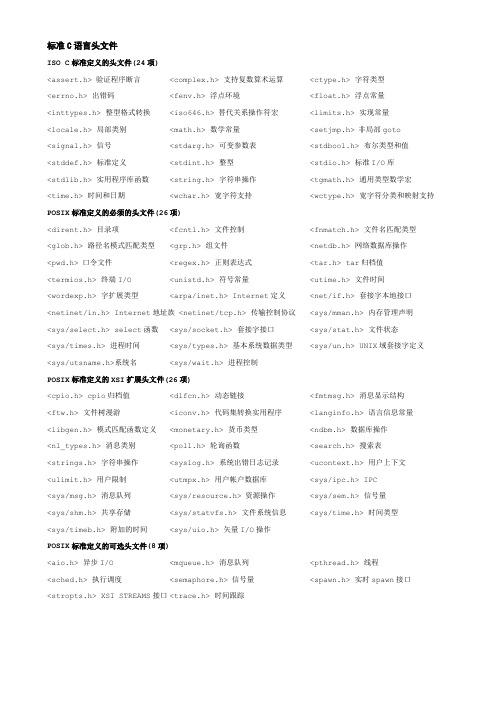
标准C语言头文件ISO C标准定义的头文件(24项)<assert.h> 验证程序断言<complex.h> 支持复数算术运算<ctype.h> 字符类型<errno.h> 出错码<fenv.h> 浮点环境<float.h> 浮点常量<inttypes.h> 整型格式转换<iso646.h> 替代关系操作符宏<limits.h> 实现常量<locale.h> 局部类别<math.h> 数学常量<setjmp.h> 非局部goto<signal.h> 信号<stdarg.h> 可变参数表<stdbool.h> 布尔类型和值<stddef.h> 标准定义<stdint.h> 整型<stdio.h> 标准I/O库<stdlib.h> 实用程序库函数<string.h> 字符串操作<tgmath.h> 通用类型数学宏<time.h> 时间和日期<wchar.h> 宽字符支持<wctype.h> 宽字符分类和映射支持POSIX标准定义的必须的头文件(26项)<dirent.h> 目录项<fcntl.h> 文件控制<fnmatch.h> 文件名匹配类型<glob.h> 路径名模式匹配类型<grp.h> 组文件<netdb.h> 网络数据库操作<pwd.h> 口令文件<regex.h> 正则表达式<tar.h> tar归档值<termios.h> 终端I/O <unistd.h> 符号常量<utime.h> 文件时间<wordexp.h> 字扩展类型<arpa/inet.h> Internet定义<net/if.h> 套接字本地接口<netinet/in.h> Internet地址族 <netinet/tcp.h> 传输控制协议<sys/mman.h> 内存管理声明<sys/select.h> select函数<sys/socket.h> 套接字接口<sys/stat.h> 文件状态<sys/times.h> 进程时间<sys/types.h> 基本系统数据类型<sys/un.h> UNIX域套接字定义<sys/utsname.h>系统名<sys/wait.h> 进程控制POSIX标准定义的XSI扩展头文件(26项)<cpio.h> cpio归档值<dlfcn.h> 动态链接<fmtmsg.h> 消息显示结构<ftw.h> 文件树漫游<iconv.h> 代码集转换实用程序<langinfo.h> 语言信息常量<libgen.h> 模式匹配函数定义<monetary.h> 货币类型<ndbm.h> 数据库操作<nl_types.h> 消息类别<poll.h> 轮询函数<search.h> 搜索表<strings.h> 字符串操作<syslog.h> 系统出错日志记录<ucontext.h> 用户上下文<ulimit.h> 用户限制<utmpx.h> 用户帐户数据库<sys/ipc.h> IPC<sys/msg.h> 消息队列<sys/resource.h> 资源操作<sys/sem.h> 信号量<sys/shm.h> 共享存储<sys/statvfs.h> 文件系统信息<sys/time.h> 时间类型<sys/timeb.h> 附加的时间<sys/uio.h> 矢量I/O操作POSIX标准定义的可选头文件(8项)<aio.h> 异步I/O <mqueue.h> 消息队列<pthread.h> 线程<sched.h> 执行调度<semaphore.h> 信号量<spawn.h> 实时spawn接口<stropts.h> XSI STREAMS接口<trace.h> 时间跟踪标准 C++ 语言头文件(54个其中16个用于构建STL,3个为附加非必须)<algorithm>STL通用算法<bitset> STL位集容器<cassert> 用于在程序运行时执行断言<cctype> 字符处理<cerrno> 错误码<cfloat> 用于测试浮点类型属性<ciso646> ISO646变体字符集<climits> 测试整数类型属性<clocale> 本地化函数<cmath> 数学函数<complex>复数类<csetjmp> 执行非内部的goto语句<csignal> 信号<cstdarg> 访问参数数量变化的函数<cstddef> 用于定义实用的类型和宏<cstdio> 输入/输出<cstdlib> 杂项函数及内存分配<cstring> 字符串<ctime> 时间<cwchar> 宽字符处理及输入/输出<cwctype> 宽字符分类<deque> STL双端队列容器<exception> 异常处理类<fstream> 文件流<functional> STL函数对象<iomanip> 参数化输入/输出<ios>基本输入/输出支持<iosfwd> 输入/输出前置声明<iostream> 数据流输入/输出<istream> 基本输入流<iterator> 遍历序列的类<limits> 各种数据类型最值常量<list>STL线性列表容器<locale> 国际化支持<map> STL映射容器<memory> 专用内存分配器<new> 基本内存分配和释放<numeric> 通用的数字操作<ostream> 基本输出流<queue> STL 队列容器<set> STL 集合容器<sstream> 基于字符串的流<stack> STL 堆栈容器<stdexcept> 标准异常类<streambuf> iostream 的缓冲区类<string> 字符串类<strstream> 非内存字符序列的流类<typeinfo> 运行时类型标识<utility> STL 通用模板类<valarray> 支持值数组的类和模版类<vector> STL 动态数组容器标准C++附加的头文件(3个)非必须<hash_map> <hash_set> <slist>The Standard C++ library consists of 51 required headers.This implementation also includes three additional headers,<hash_map>,<hash_set>,and <slist>,not required by the C++ Standard,for a total of 54 headers.Of these 54 headers,16 constitute the Standard Template Library,or STL.These are indicated below with the notation<algorithm> -- (STL) for defining numerous templates that implement useful algorithms<bitset> -- for defining a template class that administers sets of bits<complex> -- for defining a template class that supports complex arithmetic<deque> -- (STL) for defining a template class that implements a deque container<exception> -- for defining several functions that control exception handling<fstream> -- for defining several iostreams template classes that manipulate exteral files<functional>-- (STL) for defining several templates that help construct predicates for the templates defined in <algorithm> and <numeric><hash_map> -- (STL) for defining template classes that implement hashed associative containersthat map keys to values<hash_set> -- (STL) for defining template classes that implement hashed associative containers<iomanip> -- for declaring several iostreams manipulators that take an argument<ios> -- for defining the template class that serves as the base for many iostreams classes<iosfwd> -- for declaring several iostreams template classes before they are necessarilydefined<iostream> -- for declaring the iostreams objects that manipulate the standard streams<istream> -- for defining the template class that performs extractions<iterator> -- (STL) for defining several templates that help define and manipulate iterators<limits> -- for testing numeric type properties<list>-- (STL) for defining a template class that implements a doubly linked list container<locale> -- for defining several classes and templates that controllocale-specific behavior, as in the iostreams classes<map>-- (STL) for defining template classes that implement associative containers thatmap keys to values<memory>-- (STL) for defining several templates that allocate and free storage for variouscontainer classes<new> -- for declaring several functions that allocate and free storage<numeric>-- (STL) for defining several templates that implement useful numeric functions<ostream> -- for defining the template class that performs insertions<queue> -- (STL) for defining a template class that implements a queue container<set>-- (STL) for defining template classes that implement associative containers<slist>-- (STL) for defining a template class that implements a singly linked list container<sstream> -- for defining several iostreams template classes that manipulate string containers<stack> -- (STL) for defining a template class that implements a stack container<stdexcept> -- for defining several classes useful for reporting exceptions<streambuf> -- for defining template classes that buffer iostreams operations<string> -- for defining a template class that implements a string container<strstream> -- for defining several iostreams classes that manipulate in-memory character sequences<typeinfo> -- for defining class type_info, the result of the typeid operator<utility>-- (STL) for defining several templates of general utility<valarray> -- for defining several classes and template classes that support value-oriented arrays<vector>-- (STL) for defining a template class that implements a vector container新的C标准库<cassert> -- for enforcing assertions when functions execute<cctype> -- for classifying characters<cerrno> -- for testing error codes reported by library functions<cfloat> -- for testing floating-point type properties<ciso646> -- for programming in ISO 646 variant character sets<climits> -- for testing integer type properties<clocale> -- for adapting to different cultural conventions<cmath> -- for computing common mathematical functions<csetjmp> -- for executing nonlocal goto statements<csignal> -- for controlling various exceptional conditions<cstdarg> -- for accessing a varying number of arguments<cstddef> -- for defining several useful types and macros<cstdio> -- for performing input and output<cstdlib> -- for performing a variety of operations<cstring> -- for manipulating several kinds of strings<ctime> -- for converting between various time and date formats<cwchar> -- for manipulating wide streams and several kinds of strings<cwctype> -- for classifying wide characters旧的C标准库<assert.h> -- for enforcing assertions when functions execute<ctype.h> -- for classifying characters<errno.h> -- for testing error codes reported by library functions<float.h> -- for testing floating-point type properties<iso646.h> -- for programming in ISO 646 variant character sets<limits.h> -- for testing integer type properties<locale.h> -- for adapting to different cultural conventions<math.h> -- for computing common mathematical functions<setjmp.h> -- for executing nonlocal goto statements<signal.h> -- for controlling various exceptional conditions<stdarg.h> -- for accessing a varying number of arguments<stddef.h> -- for defining several useful types and macros<stdio.h> -- for performing input and output<stdlib.h> -- for performing a variety of operations<string.h> -- for manipulating several kinds of strings<time.h> -- for converting between various time and date formats<wchar.h> -- for manipulating wide streams and several kinds of strings<wctype.h> -- for classifying wide charactersFinally, in this implementation, the Standard C++ library also includes several headers for compatibility with traditional C++ libraries:<fstream.h> -- for defining several iostreams template classes that manipulate exteral files <iomanip.h> -- for declaring several iostreams manipulators that take an argument<iostream.h> -- for declaring the iostreams objects that manipulate the standard streams <new.h> -- for declaring several functions that allocate and free storage<stl.h> -- for declaring several template classes that aid migration from older versions of the Standard Template Library。
全国计算机等级考试二级C语言考试复习资料及复习计划以及考试要点

全国计算机等级考试二级C语言考试复习资料及复习计划一、C语言的特点C语言是近年来非常流行的语言,很多人宁愿放弃已经熟悉的其他语言而改用C语言,其原因是C语言有优于其他语言的一系列特点.下面是C语言的主要特点:(1)语言简洁、紧凑,并且使用方便、灵活;(2)运算符丰富;(3)数据结构丰富;(4)具有结构化的控制语句;(5)语法限制不太严格,使程序设计比较自由;(6)C语言允许用户直接访问物理地址,能进行位(bit)操作,可以直接对硬件进行操作.二、源程序的书写规则C语言的书写规则.C语言书写格式自由,一行内可以写几个语句,一个语句也可以分写在多行上。
C程序没有行号,每个语句和数据定义的最后必须有一个分号。
C语言中分号是语句中不可少的,即使是程序中的最后一个语句也应该包含分号.C语言中的注释可以用″/*″用″*/″结束,注释可以在任何允许插入空格符的地方插入。
C语言中注释不允许嵌套,注释可以用西文,也可以用中文。
三、C语言的风格由于C语言对语法限制不太严格,为了保证程序的准确性和可读性,建议在书写程序采用阶梯缩进格式。
也就是按如下格式书写C 语言程序:**********;*****(){**********;********;{******;.。
.。
.。
}*********;}概括起来,C语言程序具有如下的风格: ①C语言程序的函数具体模块结构风格,使得程序整体结构清晰、层次清楚,为模块化程序设计提供了强有力的支持。
②C语言的源程序的扩展名都是。
C.③C语言中的注释格式为:/*注释内容*/ /与*之间不允许有空格,注释部分允许出现在程序中的任何位置。
④C语言中的所有语句都必须以分号“;"结束一、程序的构成尽管C程序的内容千变万化,但是它们的构成都是一致的,一个完整的C源程序的格式可以如下表示:编译预处理主函数()函数().。
函数()从上面中可以看出,一个C源程序实际上就是若干函数的集合,这些函数中有一个是程序的主函数,任何C的源程序执行时,都是从主函数开始执行的,其它的函数最终必将被这个主函数所调用。
计算机二级考试(C语言程序设计)大纲

计算机二级考试(C语言程序设计)大纲公共基础知识基本要求1.掌握算法的基本概念。
2.掌握基本数据结构及其操作。
3.掌握基本排序和查找算法。
4.掌握逐步求精的结构化程序设计方法。
5.掌握软件工程的基本方法,具有初步应用相关技术进行软件开发的能力。
6.掌握数据库的基本知识,了解关系数据库的设计。
考试内容一、基本数据结构与算法1.算法的基本概念;算法复杂度的概念和意义(时间复杂度与空间复杂度)。
2.数据结构的定义:数据的逻辑结构与存储结构;数据结构的图形表示;线性结构与非线性结构的慨念。
3.线性表的定义;线性表的顺序存储结构及其插入与删除运算。
4.栈和队列的定义;栈和队列的顺序存储结构及其基本运算。
5.线性单链表、双向链表与循环链表的结构及其基本运算。
6.树的基本概念;二叉树的定义及其存储结构;二叉树的前序、中序和后序遍历。
7.顺序查找与二分法查找算法;基本排序算法(交换类排序,选择类排序,插入类排序)。
二、程序设计基础1.程序设计方法与风格。
2.结构化程序设计。
3.面向对象的程序设计方法,对象,方法,属性及继承与多态性。
三、软件工程基础1.软件工程基本概念,软件生命周期概念,软件工具与软件开发环境。
2.结构化分析方法,数据流图,数据字典,软件需求规格说明书。
3.结构化设计方法,总体设计与详细设计。
4.软件测试的方法,白盒测试与黑盒测试,测试用例设计,软件测试的实施,单元测试、集成测试和系统测试。
5.程序的调试,静态调试与动态调试。
四、数据库设计基础1.数据库的基本概念:数据库,数据库管理系统,数据库系统。
2.数据模型,实体联系模型及E-R图,从E-R图导出关系数据模型。
3.关系代数运算,包括集合运算及选择、投影、连接运算,数据库规范化理论。
4.数据库设计方法和步歌:需求分析、概念设计、逻辑设计和物理设计的相关策略。
考试方式1.公共基础知识不单独考试,与其他二级科目组合在一起,作为二级科目考核内容的一部分。
C语言头文件大全
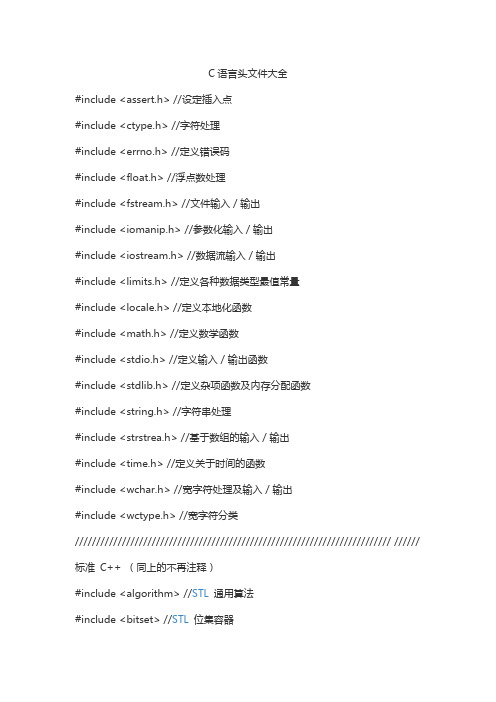
C语言头文件大全#include <assert.h> //设定插入点#include <ctype.h> //字符处理#include <errno.h> //定义错误码#include <float.h> //浮点数处理#include <fstream.h> //文件输入/输出#include <iomanip.h> //参数化输入/输出#include <iostream.h> //数据流输入/输出#include <limits.h> //定义各种数据类型最值常量#include <locale.h> //定义本地化函数#include <math.h> //定义数学函数#include <stdio.h> //定义输入/输出函数#include <stdlib.h> //定义杂项函数及内存分配函数#include <string.h> //字符串处理#include <strstrea.h> //基于数组的输入/输出#include <time.h> //定义关于时间的函数#include <wchar.h> //宽字符处理及输入/输出#include <wctype.h> //宽字符分类////////////////////////////////////////////////////////////////////////// ////// 标准C++ (同上的不再注释)#include <algorithm> //STL通用算法#include <bitset> //STL位集容器#include <cctype>#include <cerrno>#include <clocale>#include <cmath>#include <complex> //复数类#include <cstdio>#include <cstdlib>#include <cstring>#include <ctime>#include <deque> //STL双端队列容器#include <exception> //异常处理类#include <fstream>#include <functional> //STL 定义运算函数(代替运算符)#include <limits>#include <list> //STL 线性列表容器#include <map> //STL 映射容器#include <iomanip>#include <ios> //基本输入/输出支持#include <iosfwd> //输入/输出系统使用的前置声明#include <iostream>#include <istream> //基本输入流#include <ostream> //基本输出流#include <queue> //STL 队列容器#include <set> //STL 集合容器#include <sstream> //基于字符串的流#include <stack> //STL 堆栈容器#include <stdexcept> //标准异常类#include <streambuf> //底层输入/输出支持#include <string> //字符串类#include <utility> //STL 通用模板类#include <vector> //STL 动态数组容器#include <cwchar>#include <cwctype>////////////////////////////////////////////////////////////////////////// ////// #include <complex.h> //复数处理#include <fenv.h> //浮点环境#include <inttypes.h> //整数格式转换#include <stdbool.h> //布尔环境#include <stdint.h> //整型环境#include <tgmath.h> //通用类型数学宏#include<conio.h> //说明调用DOS控制台I/O子程序的各个函数。
C语言编程常用头文件
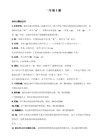
函数列表
函数类别 函数用途 详细说明
可变参数访问宏 可变参数开始宏 va_start
可变参数结束宏 va_end
可变参数访问宏 访问下一个可变参数宏 va_arg
输入输出函数
该分类用于处理包括文件、控制台等各种输入输出设备,各种函数以“流”的方式实现
头文件 stdio.h
字符串转换函数 字符串转换为整数 atoi
字符串转换为长整数 atol
字符串转换为浮点数 strtod
字符串转换为长整数 strtol
字符串转换为无符号长整型 strtoul
伪随机序列产生函数 产生随机数 rand
设置随机函数的起动数值 srand
存储管理函数 分配存储器 calloc
按长度的串拷贝 strncpy
字符串连接函数 串连接 strcat
按长度连接字符串 strncat
串比较函数 块比较 memcmp
字符串比较 strcmp
字符串比较(用于非英文字符) strcoll
按长度对字符串比较 strncmp
字符串转换 strxfrm
字符与字符串查找 字符查找 memchr
头文件 math.h
函数列表
函数类别 函数用途 详细说明
错误条件处理 定义域错误(函数的输入参数值不在规定的范围内)
值域错误(函数的返回值不在规定的范围内)
三角函数 反余弦 acos
反正弦 asin
反正切 atan
反正切2 atan2
余弦 cos
正弦 sin
头文件 time.h
函数列表
函数类别 函数用途 详细说明
计算机二级C语言程序必背
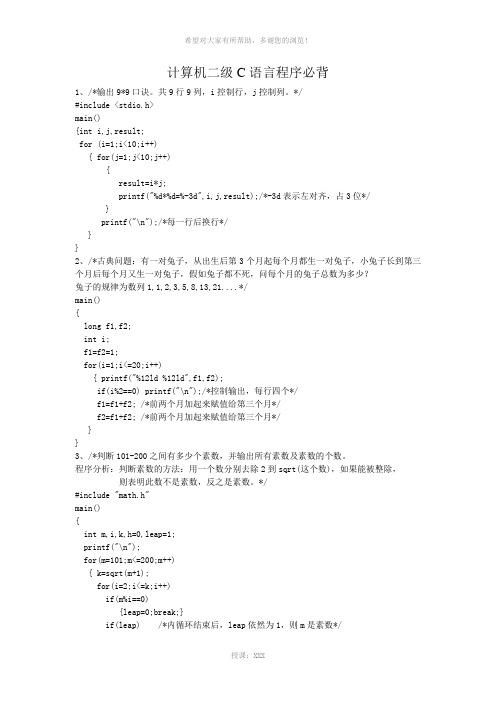
计算机二级C语言程序必背1、/*输出9*9口诀。
共9行9列,i控制行,j控制列。
*/#include <stdio.h>main(){int i,j,result;for (i=1;i<10;i++){ for(j=1;j<10;j++){result=i*j;printf("%d*%d=%-3d",i,j,result);/*-3d表示左对齐,占3位*/}printf("\n");/*每一行后换行*/}}2、/*古典问题:有一对兔子,从出生后第3个月起每个月都生一对兔子,小兔子长到第三个月后每个月又生一对兔子,假如兔子都不死,问每个月的兔子总数为多少?兔子的规律为数列1,1,2,3,5,8,13,21....*/main(){long f1,f2;int i;f1=f2=1;for(i=1;i<=20;i++){ printf("%12ld %12ld",f1,f2);if(i%2==0) printf("\n");/*控制输出,每行四个*/f1=f1+f2; /*前两个月加起来赋值给第三个月*/f2=f1+f2; /*前两个月加起来赋值给第三个月*/}}3、/*判断101-200之间有多少个素数,并输出所有素数及素数的个数。
程序分析:判断素数的方法:用一个数分别去除2到sqrt(这个数),如果能被整除,则表明此数不是素数,反之是素数。
*/#include "math.h"main(){int m,i,k,h=0,leap=1;printf("\n");for(m=101;m<=200;m++){ k=sqrt(m+1);for(i=2;i<=k;i++)if(m%i==0){leap=0;break;}if(leap) /*内循环结束后,leap依然为1,则m是素数*/{printf("%-4d",m);h++;if(h%10==0)printf("\n");}leap=1;}printf("\nThe total is %d",h);}4、/*一个数如果恰好等于它的因子之和,这个数就称为“完数”。
C语言头文件使用大全

C语言头文件使用大全1. stdio.h:提供了输入输出相关的函数,如printf和scanf。
2. stdlib.h:提供了一些通用的函数,如malloc和atoi。
3. string.h:提供了一些字符串处理的函数,如strcpy和strcat。
4. math.h:提供了数学函数,如sin和sqrt。
5. ctype.h:提供了一些字符处理的函数,如isalpha和isdigit。
7. assert.h:提供了断言机制,用于程序的调试。
8. errno.h:定义了一些错误代码,如EIO和EINVAL。
9. limits.h:定义了一些整数类型的最大值和最小值,如INT_MAX和INT_MIN。
10. float.h:定义了浮点类型的一些精度和范围,如FLT_EPSILON和DBL_MAX。
11. stdbool.h:定义了布尔类型和真值常量,如bool和true。
12. wchar.h:提供了处理宽字符的函数,如wprintf和fgetws。
13. signal.h:提供了处理信号的函数,如signal和kill。
14. dirent.h:提供了操作目录和文件的函数,如opendir和readdir。
15. fcntl.h:提供了文件控制相关的函数,如open和close。
16. sys/types.h:定义了一些系统数据类型,如size_t和pid_t。
17. sys/stat.h:定义了文件状态的一些宏和函数,如S_IRUSR和stat。
18. sys/socket.h:提供了网络编程相关的函数和结构体,如socket和bind。
19. netdb.h:提供了网络数据相关的函数和结构体,如gethostbyname和hostent。
20. pthread.h:提供了线程相关的函数和结构体,如pthread_create和pthread_mutex_t。
这些头文件仅仅是C语言头文件中的一部分,它们提供了丰富的功能来帮助我们进行程序开发。
计算机等级考试二级C语言常见知识点总结

计算机等级考试二级C语言常见知识点总结计算机等级考试二级C语言常见知识点总结总体上必须清楚的:1)程序结构是三种: 顺序结构, 循环结构(三个循环结构), 选择结构(if 和switch)2)读程序都要从main()入口, 然后从最上面顺序往下读(碰到循环做循环,碰到选择做选择)。
3)计算机的数据在电脑中保存是以二进制的形式. 数据存放的位置就是她的地址.4)bit是位是指为0 或者1。
byte 是指字节, 一个字节= 八个位.5)一定要记住二进制如何划成十进制。
概念常考到的:1、编译预处理不是C语言的一部分,不再运行时间。
C语言编译的程序称为源程序,它以ASCII数值存放在文本文件中。
2、每个C语言程序中main函数是有且只有一个。
3、在函数中不能够再定义函数。
4、算法的是一定要有输出的,她能够没有输入。
5、break可用于循环结构和switch语句。
6、逗号运算符的级别最低。
第一章1)合法的用户标识符考查:合法的要求是由字母,数字,下划线组成。
有其它元素就错了。
而且第一个必须为字母或则是下划线。
第一个为数字就错了。
关键字不能够作为用户标识符号。
main define scanf printf 都不是关键字。
迷惑你的地方If是能够做为用户标识符。
因为If中的第一个字母大写了,因此不是关键字。
2)实型数据的合法形式:2.333e-1 就是合法的,且数据是2.333×10-1。
考试口诀:e前e后必有数,e后必为整数。
.3)字符数据的合法形式::'1' 是字符占一个字节,"1"是字符串占两个字节(含有一个结束符号)。
'0' 的ASCII数值表示为48,'a' 的ASCII数值是97,'A'的ASCII数值是65。
4) 整型一般是两个字节, 字符型是一个字节,双精度一般是4个字节:考试时候一般会说,在16位编译系统,或者是32位系统。
C语言头文件使用大全
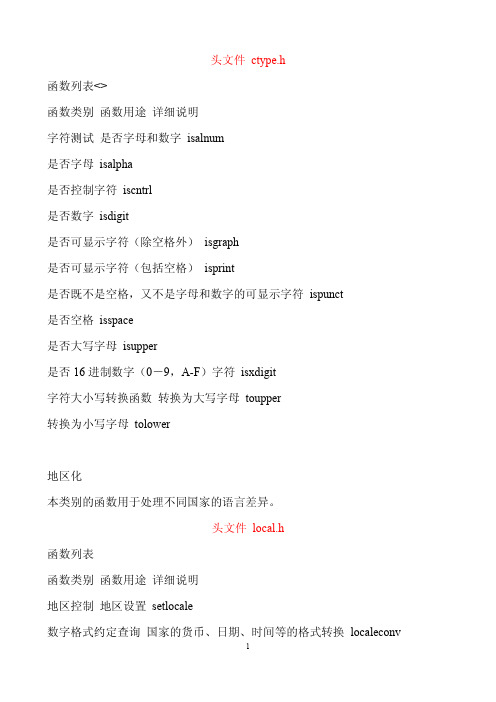
字符输入(控制台) getchar 字符串输入(控制台) gets 字符输出(控制台) putc 字符输出(控制台) putchar 字符串输出(控制台) puts 字符输出到流的头部 ungetc 直接输入输出 直接流读操作 fread 直接流写操作 fwrite 文件定位函数 得到文件位置 fgetpos 文件位置移动 fseek 文件位置设置 fsetpos 得到文件位置 ftell 文件位置复零位 remind 错误处理函数 错误清除 clearerr 文件结尾判断 feof 文件错误检测 ferror 得到错误提示字符串 perror
#include <assert.h> //设定插入点 #include <ctype.h> //字符处理 #include <errno.h> //定义错误码 #include <float.h> //浮点数处理 #include <fstream.h> //文件输入/输出 #include <iomanip.h> //参数化输入/输出 #include <iostream.h> //数据流输入/输出 #include <limits.h> //定义各种数据类型最值常量
日期和时间函数 本类别给出时间和日期处理函数
头文件 time.h 函数列表 函数类别 函数用途 详细说明 时间操作函数 得到处理器时间 clock 得到时间差 difftime 设置时间 mktime 得到时间 time 时间转换函数 得到以 ASCII 码表示的时间 asctime
9
得到字符串表示的时间 ctime 得到指定格式的时间 strftime
头文件 stdarg.h 函数列表 函数类别 函数用途 详细说明 可变参数访问宏 可变参数开始宏 va_start 可变参数结束宏 va_end 可变参数访问宏 访问下一个可变参数宏 va_arg
C语言头文件大全

标准C语言头文件ISO C标准定义的头文件(24项)<assert.h> 验证程序断言<complex.h> 支持复数算术运算<ctype.h> 字符类型<errno.h> 出错码<fenv.h> 浮点环境<float.h> 浮点常量<inttypes.h> 整型格式转换<iso646.h> 替代关系操作符宏<limits.h> 实现常量<locale.h> 局部类别<math.h> 数学常量<setjmp.h> 非局部goto<signal.h> 信号<stdarg.h> 可变参数表<stdbool.h> 布尔类型和值<stddef.h> 标准定义<stdint.h> 整型<stdio.h> 标准I/O库<stdlib.h> 实用程序库函数<string.h> 字符串操作<tgmath.h> 通用类型数学宏<time.h> 时间和日期<wchar.h> 宽字符支持<wctype.h> 宽字符分类和映射支持POSIX标准定义的必须的头文件(26项)<dirent.h> 目录项<fcntl.h> 文件控制<fnmatch.h> 文件名匹配类型<glob.h> 路径名模式匹配类型<grp.h> 组文件<netdb.h> 网络数据库操作<pwd.h> 口令文件<regex.h> 正则表达式<tar.h> tar归档值<termios.h> 终端I/O <unistd.h> 符号常量<utime.h> 文件时间<wordexp.h> 字扩展类型<arpa/inet.h> Internet定义<net/if.h> 套接字本地接口<netinet/in.h> Internet地址族 <netinet/tcp.h> 传输控制协议<sys/mman.h> 内存管理声明<sys/select.h> select函数<sys/socket.h> 套接字接口<sys/stat.h> 文件状态<sys/times.h> 进程时间<sys/types.h> 基本系统数据类型<sys/un.h> UNIX域套接字定义<sys/utsname.h>系统名<sys/wait.h> 进程控制POSIX标准定义的XSI扩展头文件(26项)<cpio.h> cpio归档值<dlfcn.h> 动态链接<fmtmsg.h> 消息显示结构<ftw.h> 文件树漫游<iconv.h> 代码集转换实用程序<langinfo.h> 语言信息常量<libgen.h> 模式匹配函数定义<monetary.h> 货币类型<ndbm.h> 数据库操作<nl_types.h> 消息类别<poll.h> 轮询函数<search.h> 搜索表<strings.h> 字符串操作<syslog.h> 系统出错日志记录<ucontext.h> 用户上下文<ulimit.h> 用户限制<utmpx.h> 用户帐户数据库<sys/ipc.h> IPC<sys/msg.h> 消息队列<sys/resource.h> 资源操作<sys/sem.h> 信号量<sys/shm.h> 共享存储<sys/statvfs.h> 文件系统信息<sys/time.h> 时间类型<sys/timeb.h> 附加的时间<sys/uio.h> 矢量I/O操作POSIX标准定义的可选头文件(8项)<aio.h> 异步I/O <mqueue.h> 消息队列<pthread.h> 线程<sched.h> 执行调度<semaphore.h> 信号量<spawn.h> 实时spawn接口<stropts.h> XSI STREAMS接口<trace.h> 时间跟踪标准 C++ 语言头文件(54个其中16个用于构建STL,3个为附加非必须)<algorithm>STL通用算法<bitset> STL位集容器<cassert> 用于在程序运行时执行断言<cctype> 字符处理<cerrno> 错误码<cfloat> 用于测试浮点类型属性<ciso646> ISO646变体字符集<climits> 测试整数类型属性<clocale> 本地化函数<cmath> 数学函数<complex>复数类<csetjmp> 执行非内部的goto语句<csignal> 信号<cstdarg> 访问参数数量变化的函数<cstddef> 用于定义实用的类型和宏<cstdio> 输入/输出<cstdlib> 杂项函数及内存分配<cstring> 字符串<ctime> 时间<cwchar> 宽字符处理及输入/输出<cwctype> 宽字符分类<deque> STL双端队列容器<exception> 异常处理类<fstream> 文件流<functional> STL函数对象<iomanip> 参数化输入/输出<ios>基本输入/输出支持<iosfwd> 输入/输出前置声明<iostream> 数据流输入/输出<istream> 基本输入流<iterator> 遍历序列的类<limits> 各种数据类型最值常量<list>STL线性列表容器<locale> 国际化支持<map> STL映射容器<memory> 专用内存分配器<new> 基本内存分配和释放<numeric> 通用的数字操作<ostream> 基本输出流<queue> STL 队列容器<set> STL 集合容器<sstream> 基于字符串的流<stack> STL 堆栈容器<stdexcept> 标准异常类<streambuf> iostream 的缓冲区类<string> 字符串类<strstream> 非内存字符序列的流类<typeinfo> 运行时类型标识<utility> STL 通用模板类<valarray> 支持值数组的类和模版类<vector> STL 动态数组容器标准C++附加的头文件(3个)非必须<hash_map> <hash_set> <slist>The Standard C++ library consists of 51 required headers.This implementation also includes three additional headers,<hash_map>,<hash_set>,and <slist>,not required by the C++ Standard,for a total of 54 headers.Of these 54 headers,16 constitute the Standard Template Library,or STL.These are indicated below with the notation<algorithm> -- (STL) for defining numerous templates that implement useful algorithms<bitset> -- for defining a template class that administers sets of bits<complex> -- for defining a template class that supports complex arithmetic<deque> -- (STL) for defining a template class that implements a deque container<exception> -- for defining several functions that control exception handling<fstream> -- for defining several iostreams template classes that manipulate exteral files<functional>-- (STL) for defining several templates that help construct predicates for the templates defined in <algorithm> and <numeric><hash_map> -- (STL) for defining template classes that implement hashed associative containersthat map keys to values<hash_set> -- (STL) for defining template classes that implement hashed associative containers<iomanip> -- for declaring several iostreams manipulators that take an argument<ios> -- for defining the template class that serves as the base for many iostreams classes<iosfwd> -- for declaring several iostreams template classes before they are necessarilydefined<iostream> -- for declaring the iostreams objects that manipulate the standard streams<istream> -- for defining the template class that performs extractions<iterator> -- (STL) for defining several templates that help define and manipulate iterators<limits> -- for testing numeric type properties<list>-- (STL) for defining a template class that implements a doubly linked list container<locale> -- for defining several classes and templates that controllocale-specific behavior, as in the iostreams classes<map>-- (STL) for defining template classes that implement associative containers thatmap keys to values<memory>-- (STL) for defining several templates that allocate and free storage for variouscontainer classes<new> -- for declaring several functions that allocate and free storage<numeric>-- (STL) for defining several templates that implement useful numeric functions<ostream> -- for defining the template class that performs insertions<queue> -- (STL) for defining a template class that implements a queue container<set>-- (STL) for defining template classes that implement associative containers<slist>-- (STL) for defining a template class that implements a singly linked list container<sstream> -- for defining several iostreams template classes that manipulate string containers<stack> -- (STL) for defining a template class that implements a stack container<stdexcept> -- for defining several classes useful for reporting exceptions<streambuf> -- for defining template classes that buffer iostreams operations<string> -- for defining a template class that implements a string container<strstream> -- for defining several iostreams classes that manipulate in-memory character sequences<typeinfo> -- for defining class type_info, the result of the typeid operator<utility>-- (STL) for defining several templates of general utility<valarray> -- for defining several classes and template classes that support value-oriented arrays<vector>-- (STL) for defining a template class that implements a vector container新的C标准库<cassert> -- for enforcing assertions when functions execute<cctype> -- for classifying characters<cerrno> -- for testing error codes reported by library functions<cfloat> -- for testing floating-point type properties<ciso646> -- for programming in ISO 646 variant character sets<climits> -- for testing integer type properties<clocale> -- for adapting to different cultural conventions<cmath> -- for computing common mathematical functions<csetjmp> -- for executing nonlocal goto statements<csignal> -- for controlling various exceptional conditions<cstdarg> -- for accessing a varying number of arguments<cstddef> -- for defining several useful types and macros<cstdio> -- for performing input and output<cstdlib> -- for performing a variety of operations<cstring> -- for manipulating several kinds of strings<ctime> -- for converting between various time and date formats<cwchar> -- for manipulating wide streams and several kinds of strings<cwctype> -- for classifying wide characters旧的C标准库<assert.h> -- for enforcing assertions when functions execute<ctype.h> -- for classifying characters<errno.h> -- for testing error codes reported by library functions<float.h> -- for testing floating-point type properties<iso646.h> -- for programming in ISO 646 variant character sets<limits.h> -- for testing integer type properties<locale.h> -- for adapting to different cultural conventions<math.h> -- for computing common mathematical functions<setjmp.h> -- for executing nonlocal goto statements<signal.h> -- for controlling various exceptional conditions<stdarg.h> -- for accessing a varying number of arguments<stddef.h> -- for defining several useful types and macros<stdio.h> -- for performing input and output<stdlib.h> -- for performing a variety of operations<string.h> -- for manipulating several kinds of strings<time.h> -- for converting between various time and date formats<wchar.h> -- for manipulating wide streams and several kinds of strings<wctype.h> -- for classifying wide charactersFinally, in this implementation, the Standard C++ library also includes several headers for compatibility with traditional C++ libraries:<fstream.h> -- for defining several iostreams template classes that manipulate exteral files <iomanip.h> -- for declaring several iostreams manipulators that take an argument<iostream.h> -- for declaring the iostreams objects that manipulate the standard streams <new.h> -- for declaring several functions that allocate and free storage<stl.h> -- for declaring several template classes that aid migration from older versions of the Standard Template Library。
C语言常见头文件汇总

C语言常见头文件汇总C语言是一种广泛应用的编程语言,在学习和使用C语言时,我们通常会使用一些常见的头文件来调用各种函数和实现一些功能。
以下是一些常见的C语言头文件及其功能的汇总:1. stdio.h:提供了一些输入输出相关的函数,如printf、scanf等。
它是C语言中最常见的、最基础的头文件之一2. math.h:提供了数学运算相关的函数,如sin、cos、sqrt等。
3. string.h:提供了一些字符串操作相关的函数,如strcpy、strcat、strlen等。
4. stdlib.h:提供了一些通用的函数,如malloc、free、rand等。
5. ctype.h:提供了一些用于字符处理的函数,如isalnum、isalpha、tolower等。
6. stdbool.h:定义了bool类型及其取值true和false。
8. assert.h:提供了一些断言相关的函数,如assert。
9. limits.h:定义了一些与整数类型相关的宏,如INT_MAX、INT_MIN等。
10. float.h:定义了一些与浮点数类型相关的宏,如FLT_MAX、FLT_MIN等。
11. errno.h:定义了一些与错误码相关的宏和函数,如errno、perror等。
12. fcntl.h:定义了一些与文件控制相关的宏和函数,如open、close等。
13. signal.h:定义了一些与信号处理相关的宏和函数,如signal、kill等。
14. setjmp.h:定义了一些与非局部跳转相关的宏和函数,如setjmp、longjmp等。
15. locale.h:定义了一些与本地化相关的宏和函数,如setlocale、localeconv等。
16. stdarg.h:定义了一些用于可变参数函数的宏和函数,如va_list、va_start、va_arg等。
17. ctype.h:定义了一些字符分类函数,如isalpha、isdigit等。
C语言计算机二级考试必备.docx

现在每个人的水平没差多少,想比别人好就要多花时间,没有谁没学就会!!计算机二级考试时间2010年6月14、15日。
大家在6月前先把选择题弄懂!现在上课老师讲题目一定要听!很有用!!不花时间真的来不急了!不懂互相问下!!第三章(1)在C语言中,合法的字符常量是()。
A),字,B)”A“ C)”ABC” D) *\x4r(2)C语言的下列运算符中,优先级最高的运算符是()oA) ++ B) + 二C) II D) !=⑶字符串〃\\\〃ABC\〃\\〃的长度是()。
A) 11 B) 7 C) 5 D) 3(4)执行语句a x= (a=3, b=a--);”后,x、a、b的值依次为()。
A) 3,3,2 B) 3,2,2 C) 3,2,3 D) 2,3,2(5)在C语言中,下列合法的变量名是()。
A) b. catB) -pl20 staticD) p l2(6)设有说明语句int i; char ch; double d;则表达式d二12. 0, ch二'a', i二5;的值是()。
A) 'a'B) 50 12. OD) 97(7)设i,j是具有确定值的整型变量,则表达式i>=j II i<j的值是()。
A)变量j的值B)变量i的值C) OD) 1(8)设有说明语句int i;double d;则表达式(int) (3*i+d/2)+3. 0的数据类型是()。
A) doubleB) charC) unsignedD) int(9)假设所有变量均为整型,则表达式(b=3,a=4,b++,a+b)的值是()。
A) 7B) 80 6D) 5(10)设沪12, a定义为整型变量。
表达式a+=a-=a*=a的值为()。
A) 12B) 144C) 0D) 132答案:DABCD BDABC第四章(1)已知A的ASCII码的十进制值为65, O的ASCII码的十进制值为48,则以下程序运行结果是()。
- 1、下载文档前请自行甄别文档内容的完整性,平台不提供额外的编辑、内容补充、找答案等附加服务。
- 2、"仅部分预览"的文档,不可在线预览部分如存在完整性等问题,可反馈申请退款(可完整预览的文档不适用该条件!)。
- 3、如文档侵犯您的权益,请联系客服反馈,我们会尽快为您处理(人工客服工作时间:9:00-18:30)。
C语言常见头文件计算机二级必备
#include<assert.h>//设定插入点#include<ctype.h>//字符处理
#include<errno.h>//定义错误码
#include<float.h>//浮点数处理
#include<fstream.h>//文件输入/输出
#include<iomanip.h>//参数化输入/输出
#include<iostream.h>//数据流输入/输出
#include<limits.h>//定义各种数据类型最值常量
#include<locale.h>//定义本地化函数
#include<math.h>//定义数学函数
#include<stdio.h>//定义输入/输出函数
#include<stdlib.h>//定义杂项函数及内存分配函数
#include<string.h>//字符串处理
#include<strstrea.h>//基于数组的输入/输出
#include<time.h>//定义关于时间的函数
#include<wchar.h>//宽字符处理及输入/输出
#include<wctype.h>//宽字符分类
////////////////////////////////////////////////////////
//////////////////
标准C++(同上的不再注释)
#include<algorithm>//STL通用算法
#include<bitset>//STL位集容器
#include<cctype>
#include<cerrno>
#include<clocale>
#include<cmath>
#include<complex>//复数类
#include<cstdio>
#include<cstdlib>
#include<cstring>
#include<ctime>
#include<deque>//STL双端队列容器
#include<exception>//异常处理类
#include<fstream>
#include<functional>//STL定义运算函数(代替运算符)#include<limits>
#include<list>//STL线性列表容器
#include<map>//STL映射容器
#include<iomanip>
#include<ios>//基本输入/输出支持
#include<iosfwd>//输入/输出系统使用的前置声明
#include<iostream>
#include<istream>//基本输入流
#include<ostream>//基本输出流
#include<queue>//STL队列容器
#include<set>//STL集合容器
#include<sstream>//基于字符串的流
#include<stack>//STL堆栈容器
#include<stdexcept>//标准异常类
#include<streambuf>//底层输入/输出支持
#include<string>//字符串类
#include<utility>//STL通用模板类
#include<vector>//STL动态数组容器
#include<cwchar>
#include<cwctype>
using namespace std;
//////////////////////////////////////////////////////// //////////////////
C99增加
#include<complex.h>//复数处理
头文件最主要的功能是起到声明作用,比如说,在某个类中,你要用到如下头文件:
#include<stdio.h>
#include<stdlib.h>
#include<string.h>
#include<strstrea.h>
你就可以自定义一个头文件,然后把这些头文件放到自定义的头文件中,然后在那个类开头包含自定义的头文件就行了,不需要再写以上头文件,这样就使代码显得简练易懂.
c++里面的类,函数,变量都有声明和定义的区别
在用到一个类或函数或变量之前,必须进行声明,但可以在之后定义。
比如
//声明go
int main(){
go();
}
int go(){
cout<<"go";
}
如果没有之前
的go的声明,在main中调用是会出错的
但把所有的声明都放在文件的开头会比较麻烦,而且,如果go这个函数在其他的文件中要用到时,在其他的文件里面也要对go()进行声明
//2.cpp
//声明go
int haha(){
go();
}
这样在文件很多时容易出错。
所以,我们就把所有的声明,如go的声明放在一个文件中,比如1.h.
这样,在2.cpp里面,只要#include"1.h",就可以直接调用go了。
